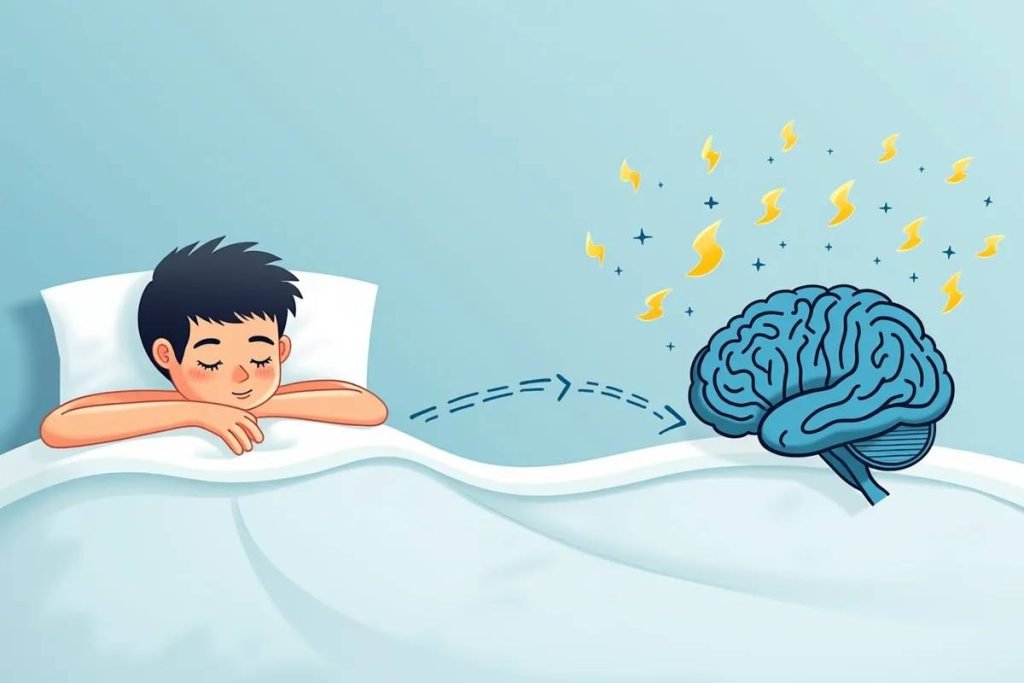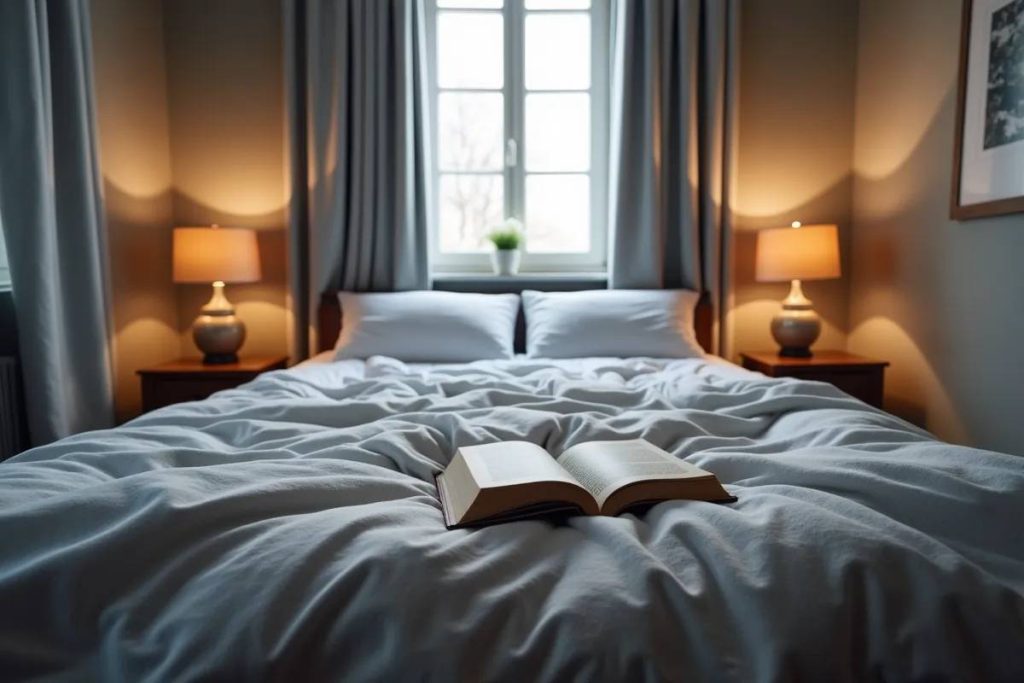The Link Between Sleep and Mental Health
Ever wondered why a restless night leaves you feeling like a zombie the next day? Imagine your brain as a finely tuned machine that needs regular maintenance to function optimally. This guide dives deep into how quality sleep is not just a luxury but a necessity for maintaining emotional balance and mental clarity.
From understanding the intricate link between sleep and mental health to uncovering practical strategies for better sleep hygiene, this article uncovers the secrets to a healthier mind through the power of rest.
“Sleep is the golden chain that ties health and our bodies together.” – Thomas Dekker

Understanding the Connection
Sleep and mental health are as tight as two frogs on a lily pad. Quality sleep is key to keeping emotions and psyche on track. Lack of sleep can mess with your head, and having stuff already stewing upstairs can mess with sleep. Recognizing this back-and-forth can help tackle both sleep issues and mental moodiness.
How Sleep Impacts Your Mind
Getting your Z’s isn’t just about feeling perky—it’s about staying sane. Regular, deep sleep gives your brain the fuel it needs to handle feelings and fight off stress. Skip your shut-eye, and you might end up twitchy and in a gloomier headspace, not able to think straight. Peep the table below to see how snoozing time can tweak your mood.
| Sleep Time | Effect on Your Noggin |
|---|---|
| Under 5 hours | Fire alarm stress, worry overload, downer vibes |
| 5-6 hours | Grumpy guts, brain fog |
| 7-8 hours | Master of chill, happier, sharper thoughts |
| Over 8 hours | Slug mode, risks of oversleep blues |
Grasping how sleep and mental health are like peanut butter and jelly can lead folks to healthier life choices. Cranking up your sleep game can give your emotions a boost. To learn how to kick stress to the curb, swing by our piece on cutting stress.
If fretting over stuff or feeling blue, catching more Z’s can really help. Taming stress with mindfulness tricks might stop those brain spins at night, helping you nod off faster. Plus, folks busting a move via exercise perks often sleep better.
Let’s not forget that nurturing feel-good friendships can up your sleep and mood game. With buddies who’ve got your back, you’re less likely to be up counting sheep. Knowing how it all fits can lead you to choices that boost both your sack time and sanity.
Importance of Quality Sleep
Grasping how a good night’s sleep can change your life might just be the key to keeping your mind sharp and emotions in check. Catching those quality Z’s isn’t just about avoiding yawning through meetings – it’s about keeping your mental gears in tip-top shape.
How Much Sleep is Needed
Sleeping needs can differ with age, but let’s face it, everyone’s better with a solid snooze. Here’s a handy chart on how much shut-eye keeps folks on their A-game:
| Age Group | Recommended Hours of Sleep |
|---|---|
| Infants (4-12 months) | 12-16 hours (including naps) |
| Toddlers (1-2 years) | 11-14 hours (including naps) |
| Preschoolers (3-5 years) | 10-13 hours (including naps) |
| School-age (6-12 years) | 9-12 hours |
| Teens (13-18 years) | 8-10 hours |
| Adults (18-64 years) | 7-9 hours |
| Older Adults (65+ years) | 7-8 hours |
Clocking these hours isn’t just about ticking a box – it’s about keeping your cool and emotional sanity in check. For more deep dives into sleep and mental chill, swing by our piece on mental health improvement.
Effects of Sleep Deprivation on Mental Health

Running low on sleep can mess with your head in more ways than one. Imagine trying to run a marathon with no training – that’s your brain on sleep deprivation. Here’s a lowdown on what you might face:
- Anxiety and Stress: Skimpy sleep can ramp up anxiety levels. Less than enough sleep leaves folks feeling frazzled, and handling stress turns into a full-on wrestling match. For more stress-smashing tips, check out our stress management techniques.
- Depression: Missed winks and depression are like PB&J – they often go hand in hand. Those wrestling with sleep disorders may find gloomy skies roll in too often. Find out more about this drag of a connection on our depression body image.
- Impaired Cognitive Function: Sleep skimping can throw a wrench into your mental machinery – think dodgy concentration, botched decisions, and the inability to crack simple puzzles. Rev up your mental engine by peeping building mental resilience.
- Mood Swings: Lack of sleep can make your temper a live wire, snuffing out your ability to roll with life’s punches. Check out mindfulness for emotional regulation for mood-smoothing moves.
Picking up on healthy sleep habits and taking sleep issues seriously can dial up your mental wellness. Scope out tips from our ultimate self-care guide for more life hacks.
Nailing the essence of quality sleep and tackling sleep deprivation can seriously step up your mental game. Keep on top of your sleep and health habits to keep your noggin and body in prime condition.
A good laugh and a long sleep are the best cures in the doctor’s book.” – Irish Proverb
Common Mental Health Conditions
Getting those Z’s is a big deal when it comes to mental health, especially for folks juggling mental wellness issues. Here’s a look at some well-known mental health concerns and the role sleep plays in each.
Anxiety Disorders
Anxiety throws a big ol’ party full of worry and fear—no fun at all! Lack of solid sleep just makes anxiety party harder. It’s like endless tag; anxiety stops you from snoozing, and being beat adds to your worries.
Think Generalized Anxiety Disorder, Social Anxiety, or Panic Attacks—they’re all in the anxiety crew. Catching enough shut-eye might take the edge off. Could use some tips? Check out how to keep calm and stress less.
| Condition | Prevalence (%) | Impact of Lousy Sleep |
|---|---|---|
| Generalized Anxiety Disorder | 3.1% | More worry and stress |
| Social Anxiety Disorder | 7.1% | Tough times in social scenes |
| Panic Disorder | 2.7% | More freak-out moments |
Depression
Depression feels like carrying a weight of sadness and blah. Missing sleep might just make that weight heavier. Good sleep doesn’t cure, but it sure helps lighten the load.
Those struggling with gloom often face sleep battles, spinning them deeper into the down mood cycle. Find more ways to manage by reading about depression’s impact on body image.
| Condition | Prevalence (%) | Impact of Lousy Sleep |
|---|---|---|
| Major Depressive Disorder | 6.7% | Extra sadness and tire |
| Persistent Depressive Disorder | 1.5% | Constant tiredness and boredom |
Bipolar Disorder
Bipolar rides a rollercoaster of highs and lows. Both exhilaration and depression wreak havoc on sleep rhythms, which messes with mental well-being.
Manic times mean less snooze needed, while low periods result in too much sleep. Finding that Goldilocks sleep schedule can help tame bipolar’s ups and downs. Learn balance tricks in mental resilience tips.
| Condition | Prevalence (%) | Impact of Lousy Sleep |
|---|---|---|
| Bipolar I Disorder | 1.0% | Amps up manic and depressed spells |
| Bipolar II Disorder | 1.1% | Rollercoaster of moods and grumpiness |
Keeping a steady sleep schedule is more crucial than you’d think for these mental hurdles. Head over to mental health tips and beat emotional munchies for more real talk.
Sleep Hygiene Practices

Getting that sweet, restful slam of snooze isn’t just about flopping onto a bed and hoping for the best. Crafting some solid sleep habits can straight-up turbocharge how well you sleep and, by extension, keep your brain happy. We’ve got two heavy hitters to tackle: setting a routine and making your sleep space all kinds of cozy.
Establishing a Sleep Routine
Nailing down a regular sleep schedule is the real MVP in getting your Zzz’s game on point. Here’s how to put it into action:
- Set a Consistent Bedtime: Hit the hay and rise at the same time every day. Yep, even when it’s “woo weekend” time.
- Pre-Bedtime Rituals: Think chill vibes – crack open a book, get your zen on with some meditation, or dip into a warm bath.
- Limit Screen Time: Kick the gadgets out of bed at least an hour before lights out. Blue light from screens messes with your sleep mojo.
Creating a Sleep-Friendly Environment
Where you sleep has a starring role when it comes to how well you sleep. Keep these things in mind for prime slumber:
- Comfortable Mattress and Pillows: If your bed’s killing your back or feels like a rock, time to swap it out for something comfy.
- Room Temperature: Aim for cool – not frigid – between 60-67°F (15-19°C). It’s the sweet spot for dreamland.
- Minimize Noise: Earplugs or a white noise gadget can make disturbances a thing of the past.
- Reduce Light: Darkness is your friend. Go for blackout curtains or slap on an eye mask to keep it pitch-dark.
| Sleep Environment Factor | Ideal Setting |
|---|---|
| Room Temperature | 60-67°F (15-19°C) |
| Noise Level | Quiet or use white noise |
| Lighting | Dark, using blackout curtains or eye mask |
Hop onto these habits, and you’ll likely snooze better, which means your brain gets a much-needed boost too.
Want more tips on keeping your stress and anxiety from messing with your sleep? Check out our resources on stress management techniques anxiety and eating habits.
Strategies for Improving Sleep
Relaxation Techniques
Finding the perfect wind down routine can work wonders for your shut-eye. Think of these methods as your bedtime warmup, prepping your mind and body for a peaceful snooze.
- Deep Breathing Exercises: Breathe deep through your nose, hold your breath for a second, then let it out slowly through the mouth. This trick taps into your body’s natural chill mode.
- Progressive Muscle Relaxation: Ever noticed how you tense up without realizing it? This exercise is all about clenching each muscle group tight and then letting them unwind. Spoiler alert: you’ll feel way more relaxed.
- Meditation and Mindfulness: Stress and sleep don’t mix well. Meditation is like a mental bath, washing away worry. Try a guided meditation or a mental checklist of your body relaxin’.
- Visualization: Daydream of your happy place. Forget about the daily grind and visualize beaches, mountains—whatever floats your boat.
For even more ways to rest easy, have a look at our piece on chilling activities for less stress.
Cognitive Behavioral Therapy for Insomnia (CBT-I)
When counting sheep isn’t cutting it, CBT-I is an all-star player in the fight against insomnia. It tweaks pesky thoughts and habits messing with your zzz’s.
- Sleep Restriction: Stay in bed only as long as you’re actually sleeping, and slowly up your bedtime game. Quality over quantity is the motto.
- Stimulus Control: Your bed’s not a couch, workspace, or dining table. Hit the hay only when you’re ready to crash and hop out if you’re just tossing around after 20 minutes.
- Cognitive Restructuring: Gotta swap out the “I can’t sleep” mindset for “I’m capable of good sleep.” Ditch anxiety-filled sleep vibes for optimism.
- Sleep Hygiene Education: Set a sleep schedule, skip the late-night caffeine hit, and make your bedroom a haven for rest.
While it’s often handled by therapists, there are DIY options and apps for those taking the solo route. Peek at our top online therapy suggestions for more info.
| CBT-I Components | What’s the Gist? |
|---|---|
| Sleep Restriction | Trim bed time to match sleep time |
| Stimulus Control | Teach your bed to play its one role |
| Cognitive Restructuring | Turn around those sleep fears |
| Sleep Hygiene | Keep it clean for better rest |
With these tricks, saying goodnight can be a whole lot easier, leaving your brain much happier, too. More resources await on boosting mental fortitude and feeling mentally stronger.
Seeking Professional Help
For many folks, reaching out to a pro can be a game changer when tackling sleep and mental hiccups. Knowing when and where to look for help can seriously boost someone’s overall vibe and health.
Consulting a Healthcare Provider
A healthcare provider’s got the lowdown on how to better your snooze sessions and mental mojo. They can spot the hidden gremlins messing up your sleep and lay down a solid plan to tackle them. Think of calling your doctor when you’ve got:
- Constant trouble nodding off or staying asleep
- Middle-of-the-day tiredness that messes with your to-do list
- Sleep-induced freak-outs or stress
- Mood swings in sync with your sleep patterns
When you chat with them, they might run some checks or suggest specific tests to get a clearer picture of your shut-eye and mental game. They’ll also dish out some tips or lifestyle tweaks to level up your sleep habits like the ones we chat about in our piece on stress-busting hacks.
Therapy and Medication Options
Once you know what’s up, your doctor might mix it up with therapy or meds. Here’s what’s on the table:
Therapy
Therapy can arm you with tools to tackle sleep and mental quirks:
- Cognitive Behavioral Therapy for Insomnia (CBT-I): This method aims to fix your sleep woes by tweaking your sleep habits and thoughts. For all the deets, check out our part on Cognitive Behavioral Therapy for Insomnia (CBT-I).
- Mindfulness-Based Therapies: Stuff like mindfulness and meditation gets your stress levels down and cranks up sleep quality. Our piece on mindfulness for keeping it cool spills the beans on this.
- Counseling and Psychotherapy: Digging deep into issues like anxiety, blues, or mood swings with counseling can step up your sleep game. Peek at our takes on anxiety chow-down habits depression and body vibes for more scoop.
Medication
When mental stuff is messing with your sleep, meds can lend a hand:
| Medication Type | What It Does | Heads Up |
|---|---|---|
| Sleep Aids | Quick fix for insomnia | Only use with your doc’s say-so |
| Antidepressants | Tackle the blues to help sleep | Let your doc guide the meds and doses |
| Anti-anxiety Medication | Quiets anxiety for better sleep | Keep an eye out for side effects |
For top results, docs often pair therapy with meds. It’s key to stick to the plan and keep the chat open with your doc for any needed tweaks.
By choosing to get professional help, folks can steer their sleep and mental health in the right direction, jazzing up their life quality. For more tips and self-care moves, pop over to our big self-care playbook and top mindfulness programs.
Supporting Loved Ones
Taking care of loved ones involves more than bringing them soup when they’re sick. Recognizing when they’re losing sleep and being their emotional backup can do wonders for their mental spunk. Combat those sleep gremlins, and you might just help them keep their sanity!
Recognizing Signs of Sleep Issues
A good night’s sleep shouldn’t be as elusive as a unicorn. Here are the red flags to watch out for, so you can jump in like a sleep superhero:
- Trouble Catching Zzz’s: If they’re tossing around more than pizza dough and can’t conk out within half an hour.
- Nighttime Rolling Stones: Frequent trips to dreamland, night after night.
- Walking Zoombie: Grogginess that clings like a bad cold, even with decent pillow time.
- Emotional Tilt-a-Whirl: More mood swings than a soap opera, and feeling blue without a rainy day in sight.
- Brain Fog: When their noggin feels like a messy junk drawer and the details slip away like Houdini.
| Signs of Sleep Issues | Symptoms |
|---|---|
| Trouble Catching Zzz’s | Takes more than 30 minutes to drift off |
| Nighttime Rolling Stones | Up and at ’em multiple times |
| Walking Zoombie | Dragging through the day |
| Emotional Tilt-a-Whirl | Grouchy, moody |
| Brain Fog | Like thinking through peanut butter |
Dive deeper into how your dreams (or lack thereof) play ping pong with your brain health. Check out our piece on mental health boost.
Providing Emotional Support
Giving a hand to your sleep-deprived peeps isn’t as daunting as quantum physics. Here’s how you can be their cheerleader:
- Open Ears: Let them spill all without you chiming in like a know-it-all.
- Promote Good Vibes: Nudge them towards a sleep-welcoming den—think, bedtime gangs, and consistent tuck-in times.
- Daily Help Hotshot: If they’re snooze-lagged, lighten the load like a helpful house elf.
- Patience is Key: Remember, lack-o-sleep is like a wild beast. Handle with tender loving care.
- A Nudge for Experts: If they’re in a sleep showdown, recommend calling in the pros or checking out therapy and helpful meds.
Remind yourself, that your patience and care could be the missing ingredient to their sleep success story! Want to help them crush stress monsters too? Peek into our chill-out tactics that’ll give their peace of mind a warm hug.
Just be there for them—we all need a personal champion when facing sleep dragons. Your support can be the secret sauce that brings harmony back to their heads and hearts.
Conclusion
In the intricate dance between sleep and mental health, each step you take towards better sleep hygiene can lead to significant improvements in your emotional and psychological well-being.
From establishing a consistent sleep routine and creating a sleep-friendly environment to employing relaxation techniques and seeking professional help when needed, every strategy discussed plays a pivotal role in nurturing your mental health.
Remember, quality sleep is the foundation upon which a resilient and happy mind is built. By prioritizing your sleep, you’re not just catching Z’s—you’re investing in a healthier, more balanced you.
Additional Resources & Authority References
- American Psychological Association
The Link Between Sleep and Emotional Well-being - Mayo Clinic
Sleep and Mental Health - Harvard Medical School
The Importance of Sleep for Mental Health
FAQs
1. How does sleep affect mental health?
Quality sleep helps regulate emotions, reduce stress, and improve cognitive functions. Lack of sleep can lead to increased anxiety, depression, and impaired decision-making.
2. What is the recommended amount of sleep for adults?
Adults aged 18-64 years should aim for 7-9 hours of sleep per night to maintain optimal mental and physical health.
3. Can improving sleep hygiene improve my mental health?
Yes, establishing good sleep habits can significantly enhance your emotional stability, reduce stress, and improve overall mental well-being.
4. What are some effective relaxation techniques to improve sleep?
Deep breathing exercises, progressive muscle relaxation, meditation, and visualization are all effective methods to help you wind down before bedtime.
5. When should I seek professional help for sleep issues?
If you experience persistent difficulty falling or staying asleep, excessive daytime sleepiness, or mood swings related to sleep patterns, it’s advisable to consult a healthcare provider.





